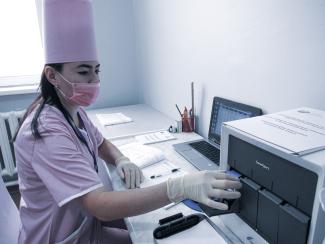A Lab Specialist from Uzbekistan Specializes in Detecting Drug-resistant TB to Serve her Country
Feruza Khudoynazarova came to lab work naturally. During her childhood in the picturesque Syrdarya region of eastern Uzbekistan, Feruza took care of her mother through a bout of illness. It was then that Feruza decided to dedicate her life to serving people as a medical worker.
Feruza started her career as a nurse at the rural medical station of Bayavut District, Syrdarya region. There, she met many people with different diseases and realized how much she wanted to accomplish professionally.
The Syrdarya region sees over 380 cases of tuberculosis (TB) each year, and Feruza saw a role for herself in providing accurate lab diagnosis for the disease. She decided to take a course at a local nurses training center and learn how to conduct tests for TB using a new, rapid, and accurate method that reveals bacterium, called mycobacterium tuberculosis, in patients’ sputum. With her upgraded qualifications, Feruza now works as a bacteriological laboratory specialist at Bayavut’s district medical association.
Feruza was in the right place at the right time to help people in her country. Uzbekistan now boasts cutting-edge equipment for TB diagnosis, including such machines as GeneXpert, Line Probe Assay, and BACTEC MGIT-960. The equipment allows quick detection of TB and determination of resistance to specific TB drugs, so that patients can start appropriate treatment. But these machines require dedicated, well-trained specialists who know how to use them, and can interpret and communicate these results.
“Inaccuracy and negligence in laboratory TB testing can cost patients their health or even their lives. I will do my best not to make such mistakes in my practice; that is why I have to improve my skills,” Feruza said.
Feruza is diligent, which makes her an ideal laboratory worker. Outside of the lab, her diligence comes across in her commitment to family. Within her traditional Uzbek household, she balances her domestic responsibilities with her desire to help people beyond her family. This motivates her every step to move forward and never give up.
As a professional, Feruza understands that TB diagnostic methods are rapidly changing, and that she needs to know updated procedures. Shortly after starting her position as a laboratory specialist, she sought out additional training at the Regional Center of Phthisiology and Pulmonology.
Feruza stood out during the virtual and in-person trainings held by laboratory specialists from the USAID Eliminating TB in Central Asia activity and specialists from the Uzbekistan TB program in all regions across the country.
During a monitoring visit to the Syrdarya region, Rafis Rakhmatullin, a USAID activity laboratory specialist was eager to share his knowledge with laboratory staff in Bayavut district. He recalled how Feruza’s enthusiasm and commitment stood out, “Feruza has a spark in her eyes for her work, she has a thorough grasp of the subject matter, she is eager to gain new experience. You can easily learn from her questions what she is capable of and that she knows what she is doing.”
Feruza’s on-the-job practical training has included operation of the GeneXpert analyzer, microscope maintenance, and identification of the causes and corrections of testing errors. Since the training six months ago, the number of GeneXpert testing process errors in Bayavut District has decreased by 50 percent, and the percentage of positive smears (indicating tuberculosis) detected by microscopy testing rose from one percent to three percent, as Feruza and other lab staff used their improved skills. The training and support provided by the USAID project have helped Feruza and her colleagues achieve practical results with huge impact for TB diagnosis.
As for the future, Feruza plans to continue her medical education to achieve the qualification of “professional laboratory specialist”. She also wants to share her knowledge with the younger generation.
Feruza says, “I went through a lot of challenges in my life and saw lots of lives broken by TB. This gives me the strength to continue sharing kindness with people.”
Since its inception in September of 2019, the USAID Eliminating Tuberculosis in Central Asia activity, has trained a total of 315 laboratory specialists in Uzbekistan, Kazakhstan, and Tajikistan. Of the 170 trained in Uzbekistan, Feruza is one of 115 female laboratory specialists equipped with new skills.
ABOUT THIS STORY
The USAID Eliminating Tuberculosis in Central Asia activity strives to improve the quality and availability of DR-TB services by building the capacity of Central Asia’s institutions in TB leadership, management, financing, and information systems. USAID works to improve TB service delivery by ensuring skilled and motivated providers in laboratories and health facilities and accessible drugs, supplies, and services.


